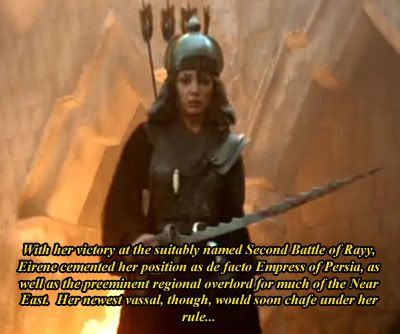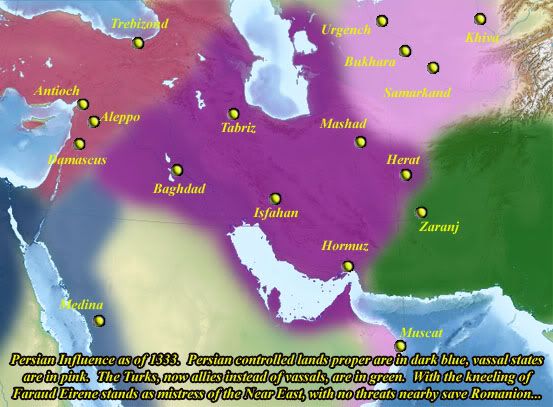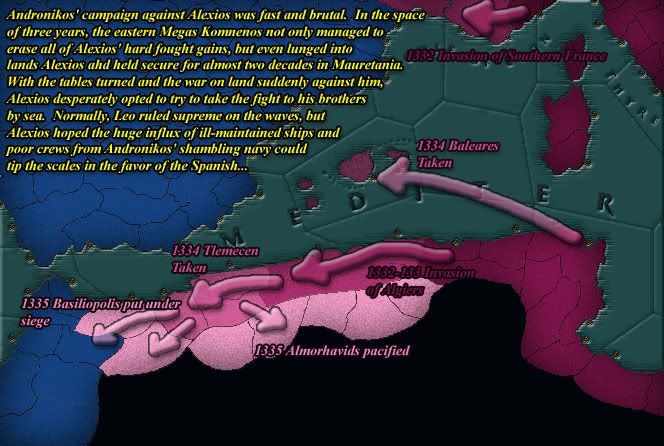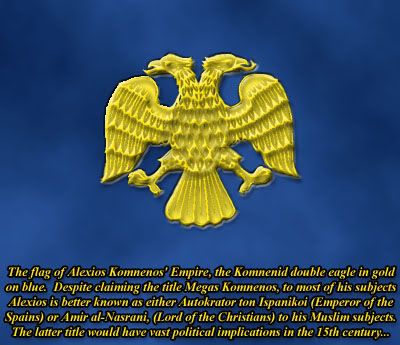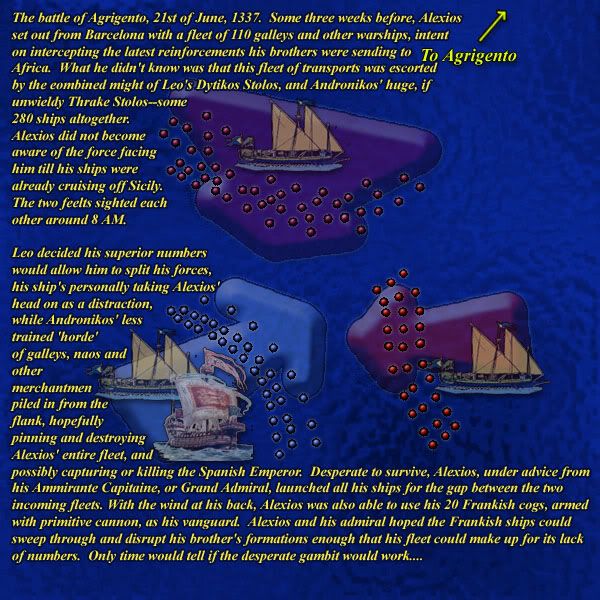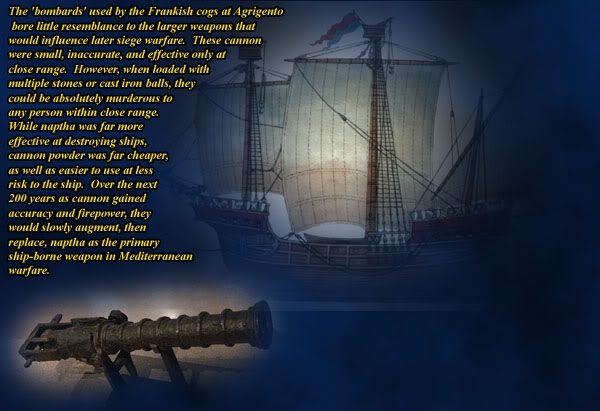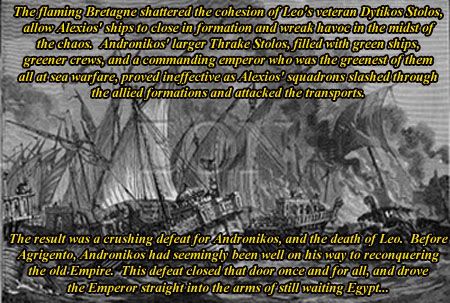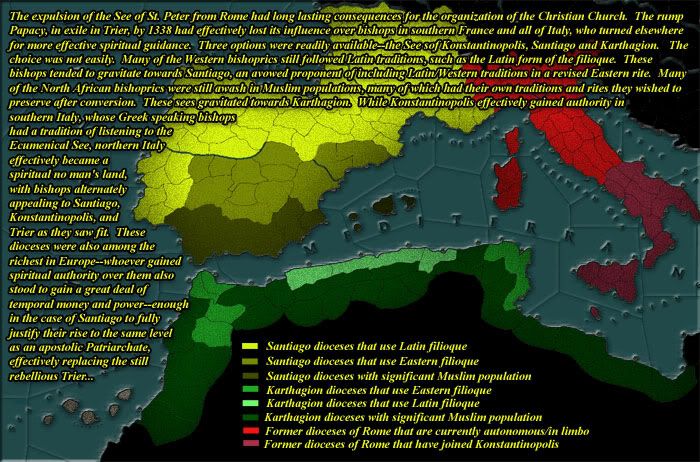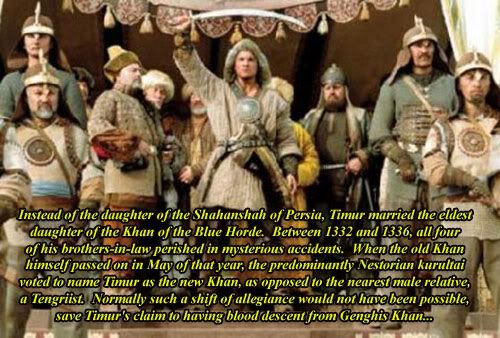Hello everyone,
I'm going to have proper replies forthcoming shortly, but first, I thought everyone would like to see the next update, and second, I do have an announcement that may dishearten a few... namely, that the chapter I'm working on right now will, in all likelihood, be the last
narrative chapter of Rome AARisen. Simply put, there's no feasible way I can finish the entire thing by the deadline I set for myself without making a transition to history book next chapter. Do not fear, however! The story will continue to 1399, but through the eyes and tales of two chroniclers most anyone who has a nose for medieval history has heard of--Ibn Khaldun, and Jean Froissart. The exact details of how it will play out are still going throguh my mind, but look for them to have some 'scholarly disagreement' in their respective renditions of the fate of the Komnenid world...
Enough sad stuff though. Update time!
“That was your Agrigento.” - Common phrase used in Romance countries to describe a decisive event.
August 5th, 1331
Eirene Kaukadeno-Komnenos hissed. Her polyen had taken the brunt of the arrow's fury, and her cloth leggings and silk underneath that had taken most of the rest, allowing only a tiny part of the tip to actually penetrate her knee. During the height of the battle, with excitement and adrenaline pumping through her body, she hadn't noticed the wound. Now, with the battle effectively over for two hours, was when her knee chose to send waves of pain in complaint.
“Highness, you should have a medicus tend to your wound.”
Butrus Hamadani no doubt meant well, but Eirene knew she couldn't have any of that. Eirene was once again thankful for her face mail—it covered the dark grimace that covered her face.
No, the men can't see their princess wincing in pain from a wound. No, they need to see her stoic, strong!
“I shall, in due time!” she called back, sweating stinging her eyes under her layers of armor.
Best to pretend I don't feel it at all. She allowed herself one last quiet grunt, before calling on years of training both in the field and in court to plaster a completely unconcerned look on her face. “What a bloody mess!” Eirene hissed, pulling off her helm and aventail. A sweaty tangle of red hair filled her eyes—she brushed it away in annoyance.
I'd cut the bloody strands off, if the good priests wouldn't complain of a shorn woman. Gamely, she swung herself out of the saddle just the way her mother taught, and
thumped on the ground. “
Spahbod! Where's Papaz?”
Where is Papaz was the question Eirene had been asking herself for the past hour. The so-called King of Transoxania was no where to be seen. Neither were his escort, his retainers, nor even half his army. No doubt, they'd either melted away, fled broken and battered, so completely was their defeat.
Poor fool, Eirene thought again. Papaz had reacted exactly to the her provoking coup as she'd hoped—he'd spent years planning, plotting, and building his army for this occasion. There was nothing wrong in his approach—he'd waited until most of Eirene's army was elsewhere, he'd taken the route of least resistance, marching hard on the fortress city of Mashad and taking it by surprise storm. From there he headed to Amol and Rayy, intending on taking the better-supplied northern route through Persia before cutting south in Mazadaram towards Isfahan itself. Militarily, the plan was sound, well-thought, and competently executed.
It just hadn't accounted for Eirene marshaling together five
vashti and force-marching her 25,000 men across the vast emptiness of Yazd provice to take the invaders from behind as the Prince of Mazadaram attempted to hold their front with his own three
vashti. Long ago, Hamadani was among many that screamed the Princess Regent was marching out with too few men, that she needed to wait, to bring together Persia's larger army—even with Mazadaram, she would be heading into battle with 25,000, versus her opponents 40,000 or more.
But Eirene had recognized a simple fact—her foe's had thrown almost everything they had in the assault, and were relying on speed to force her to the negotiating table. If her 25,000 were lost, Persia had more.
If the Transoxanians lost 10,000, they'd be crippled.
So she'd marched, hard and fast, and taken her enemy from front, flank and rear in the first light of the rising sun. Parts of the Transoxanian army had fled at first contact—horsemen, nomads more than likely. Others tried to stand and fight—infantry in formations askew, Mongol cavalry caught on foot, the royal guard in half-donned armor. In the melee Eirene had only a glance at the tall, raven haired Papaz, fighting in his nightshift, with only a sword and shield.
““We found a mangled corpse on the field wearing this,” the general said, handing over a ring. Eirene's eyes ran over its flawless form—white gold and silver, with a double headed eagle encircled by rubies.
“He is dead then?” her eyes drifted over its form.
Brave man, to stand and fight with no armor. Foolish? Perhaps. Maybe we moved so fast he couldn't escape like half his army? Too bad. He might have made a worthy Shahanshah of Persia had he married me...
“Yes, Majesty,” Hamadani nodded.
“Very well,” she sighed. Couriers were already on their way to Isfahan, and soon bells would peal, and
muezzin would call from minarets that the Lioness of Persia, called
bint Jab'reel, had won yet another victory over the hated Mongol lords of the east. The nobility of Persia would renew their vows, and her weak husband would be shunted off to a gilded prison of apartments in the palace to live out his days in luxurious impotence.
My sons will be raised to be worthy of the name Komnenos, sons of Gabriel, and will rise to great heights!
Legitimacy for her rule. Honor for her family and her sons. Full power in her hands, and not her foolish husband's.
All because of this, the Second Battle of Rayy.
All that was needed was the ceremonial end to the whole plan, the final act that would signal to the people of Persia that the Mongol nemesis was defeated once and for all, that the destruction of countless cities was avenged.
“Butrus, send a courier to Samarkand. Have him tell Papaz's son—what is his name?”
“Timur, Your Majesty.”
“Timur,” she nodded.
I need to remember that name. “Tell him that his father is lost, and his army is destroyed. Should he and his paltry kingdom wish to not fall before the Persian boot, he will travel to Isfahan, and acknowledge me as his lawful suzerain. Please make sure this,” she placed the signet ring back in Hamadani's hands, “is enclosed with the letter. Oh, and please tell him his father fought bravely.”
And died...well, she thought, but didn't say.
Battle of Agrigento Theme
June 21st, 1337
“Only an idiot would fight at sea.”
Alexios II Komnenos, self-declared
Megas Komnenos and
Autokrator ton Ispanika spat off the side of his flagship into the sea to accentuate his point.
He didn’t want to take on his two brothers at sea, no. He’d always had his best success the past three and half decades on land. On land, he’d beaten the damned Godwinsons multiple times, bested Leo thrice, and even given those Persian interlopers a good drubbing! At sea, the story was the opposite—Leo smashing him left and right, Leo having his way, manhandling Spanish naval plans as if they were created by mere children!
Damn him, Alexios grunted.
“But… we are here nonetheless?” Alexios sighed, and turned to the voice that spoke. Ismail al-Shams was a bright young boy, worthy of his surname meaning “Sun.” His family were minor nobility from Granada, with extensive and lucrative connections amongst the mercantile houses of Spain—in these days, enough to make him a page to the Emperor’s person.
“We are,” Alexios sighed. He didn’t
want to be, but Andronikos had forced his hand. His younger brother, damn him, had taken away Alexios’ one advantage with his larger armies…
Not just larger armies, Alexios admitted to himself. Andronikos was a formidable commander, easily worth three Godwinsons or anyone else Alexios had faced before in battle. Through a series of lightning marches and brilliant siegework, the other
Megas Komnenos had retaken Algiers and Oran, and had contingents laying siege to Basiliopolis itself.
In two years time, he could completely take North Africa. In another year…
Spain wouldn’t hold if Andronikos landed. The war had yet to touch Spanish soil, but the endless taxes, levies and callus had tired the people, and the nobility. If the Emperor of the East landed, a string of victorious banners added to his standards, and a huge army behind him…
No. Andronikos could not be stopped on land, so Alexios went the one route he saw open to him, the one route that previously had been closed.
The sea.
Yes, Leo was there. Yes, Leo was skilled at sea.
But Leo now has hundreds of our brother’s ships, some good quality, many not. Maybe, just maybe…
So that is why they were here, off Agrigento, Sicily, hoping to catch Leo, Andronikos, as well as the bulk of their fleet as they transported a fresh contingent of 20,000 men to the North African battlefield. It seemed the only way to stop Andronikos’ juggernaught, and was large enough sliver for Alexios to offer 20,000 silver
solidi to the one man rumored to be a better naval commander than Leo—Salvatore Dukas, the chief admiral of the Genoese fleet. That coin had brought his services, as well as 20 galleys, but Alexios knew that wouldn’t be enough.
Alexios needed more ships.
Ships that the French nobility had.
The former lands of the Frankish kingdoms were still in chaos. The Burgundian king, his attentions split between his claims to being the King of Germany and his claims to being a Capetian heir to France, couldn’t bring his full might to bear on the various French nobles. Nonetheless, seeing the fate that befell their Flemish and Norman cousins, the lords of the former
Hypatate had formed a loose coalition, the Parisian League, to block any further Burgundian attempts at conquest. For the time being, with Burgundian King Dietmar III distracted by the problems of the Arpads and von Frankens in Germany, the League could hold the line. But should Burgundy ever abandon her German ambitions, and focus her mind on France, the League would be crushed inside the fist of a giant.
So, the rebellious great men of France turned south once more—to Alexios, the nearest of the Roman emperors. He obliging agreed to take them on as clients, though his pound of flesh was paid in timber and tar. The Bretons had a rather sizable force of seagoing cogs, and the Vendee lords had a few ships of their own. Their fleets were unremarkable, save for one thing.
They had cannon.
Alexios had heard of the wondrous new artillery that had filtered west—tubes of iron, with
pyrokaroi powder inside and then a stone ball. They were slow to load, small (a small catapult did far more damage), but
by God did they make a thunderous racket that shook men to the bone, and they were murderous when fired into crowds of men! Some German named Albert had even proposed loading the contraptions with jars filled with
naptha, but more intelligent minds had overruled such a…horrific idea.
Each of those cogs has ten of those monsters, Alexios looked over at the French ships that bolstered his center ranks.
A nasty surprise for my brothers, I am sure...
While the rest of the French nobility did not have any ships, they did have coin—something equally useful to the western Roman emperor. Spain was rich, with plentiful gold and iron, but almost forty years of on and off warfare had taxed even her rich resources. Coin was hard to come by.
So Alexios set his price—100 ships, crewed and paid for by the French nobility, to serve in the Spanish fleet for a period of ten years—a pricey sum, but coupled with the busy dockyards of Barcelona, Cadiz and Valencia, enough to build a fleet large enough to give even the combined forces of Andronikos and Leo pause.
Or so Alexios' had thought.
“Signal from
Demetrios, Majesty!”
Kentarchos Demetrios Katiokes, commander of Alexios’ flagship
Basilieos Megas, called again. “Sixty-four sail spotted, bearing east northeast.”
“Sixty-four?” Alexios asked.
Dukas was sure that those bastards had something like three hundred ships. Maybe it’s an advance guard. Maybe it’s a ruse? Maybe, just once, Leo screwed up a deployment at sea?
“Another signal, Majesty! Dukas has his count at one hundred fifty sail, these bearing northeast, with more coming out of the mist!”
“There they are,” Alexios muttered to no one in particular. Two prongs, coming from two different directions.
Of course. Leo always surprises us, Alexios thought glumly,
Because it’s Leo, and Leo always wins at sea. Damn Andronikos, damn them both!
As he cursed his luck at facing a brother preeminent on land, and another at sea, Alexios looked over to the flagship of his grand admiral. Slowly, three blue banners rose up the halyards of the
Hagios Demetrios. Once they reached the crest, the lowest of the three dipped, then rose.
Enemy spotted, north by northeast, Alexios thought. A green banner then climbed up the halyards as well.
Plan B? His brow furrowed.
“Captain, raise a green banner!” Alexios called to Katiokes.
Dukas, I hope what you are about, the
Megas Komnenos hoped.
The cogs have only sails, they can't turn into the wind, the Emperor remembered. Once again, Alexios was thankful that naval warfare was the
Amirante-Capitan's domain, and if the he recommended that the center charge headlong at Andronikos' fleet as a distraction, so be it.
If Dukas is right, the cogs will get one chance, one chance only, to close with the enemy. We have the wind behind us, the Emperor nodded. Yes, it was good, he reassured himself.
Dukas is the best money could buy. It’s a good plan. It’s… the best we have.
The flags on the
Hagios Demetrios raised and dipped in response, and slowly the Spanish armada turned to face the two pronged foe bearing down on them. None of the eastern ships had their sails raised—sails were irrelevant. They likely thought this would merely be an oar on oar engagement.
Maybe we’ll catch Leo by surprise, just this once…
“Captain,” Alexios breathed hard, “Red banner!”
“Aye, Majesty! Red banner!” Katiokotes saluted, before a slew of orders erupted from his mouth as he stalked to the sterncastle. “
Bandaphoros! Raise the red banner! Drummer, beat ramming speed!
Boukinator!” he turned to the ship's trumpeter, “sound the call for ramming speed, follow the flag!”
Notes thundered from the trumpeter's horn, answered first from the
Skotos, then the next ship in line, then another, and another, until the same staccato notes rolled over the waves. In the gathering gloom, hundreds of huge shadows ponderously turned, as the prows of the Spanish galleys turned to the east. Orders barked, and canvas fluttered as the Frankish cogs made sail. Individual drums joined one another, turning into a dull thunder that flooded over the wash of thousands of oars on the waves. The slight breeze became a stiff wind in Alexios' face, as the
Basilieos Megas led the vanguard of the combined armada forward.
“Gauntlets?” the
Megas Komnenos asked, trying to hide the uncertainty in his voice. Alexios felt his gauntlets slide into the palm of his hand, trembling slightly. He turned—poor Shams a-Din was shaking like a leaf.
“It's nothing to worry about,” the Emperor told his page, and himself. “This is the best ship afloat, boy. We'll cut through the usurper fleet like I cut through that haunch of lamb last night.”
Slowly, because it was undercooked, he reminded himself.
Dukas was the best we could find. The Frankish bombards will rout my brothers. All will be well.
“There!” a voice called. Alexios looked up as one of the marines pointed into the gloom. The Emperor squinted—yes, he could see them now as well. The hulking forms of distant ships, thin lips of white periodically splashing from their flanks.
They're coming at us at full tilt too.
“Keep in time!
Boukinator, three blasts for general engagement! Sophitis! Keep that tiller steady!” Katioketes marched up and down the deck, shepherding his men, his ship, with a grace and calmness that made the landloving Emperor jealous. Alexios closed his eyes as al-Shams fasted his helm, set his gilded mail aventail in place, then fastened more mail over the lower part of his face.
Calm, Alexios. Calm. Alexios had seen plenty of battle—twenty field battles, countless sieges up and down the African coast, but nothing,
nothing, compared to a battle at sea. There was no room to manuever once ships were locked, and on all sides was the cold, deadly embrace of the sea. Any man in heavy mail that fell into the cold grasp of the Mediterranean was bound for a gloomy trip to the bottom.
Alexios looked up through the narrow slits his armor allowed. The fleet was falling into a rough line abreast, two lines deep, galleys as in time as the rough seas allowed. Ahead of them, the Frankish cogs were taking full advantage of the wind to pull in front—Dukas hoped their larger hulls and loud bombards would disorder the eastern formations, just before the Spanish galleys closed for the kill. As Alexios' eyes drifted in front of his ships, he had his doubts.
They're coming at us in a perfect line, he thought with a sinking feeling.
Steady clip. If they hit us ordered, we only have 110 galleys to their... what? Three hundred? Maybe more?
As planned, the Frankish cogs and sailing ships steadily pulled ahead of the galleys, the brisk easterly wind filling their sails. Alexios watched as they pulled away, archers flooding their raised fore and sterncastles, while men in pothelms loaded and cursed at their wondrous bombards.
Godspeed, the Emperor prayed silently,
It all depends on you. For several minutes, the voices of men were quiet, replaced by the steady wash of oars, and the rhythmic rumble of drums.
“The cogs are almost on them!” al-Shams finally shouted. Alexios looked up just in time to see a blotch of white erupt from the flank of the
Sainte Denis, then another, then another, as the ship sped past the foremost of the eastern galleys. A second later, a loud crack, almost the same as a whip snapping overhead, echoed across the waves.
Basilieos Megas' oars visibly paused, as oarsman and marine alike craned to look at the sight of the bombards erupting in anger. A series of puffs rippled off the Frankish ship's sterncastle as well, and her foe suddenly lurched to the right. Katioketes screamed that the Frankish cog must've killed the easterner's helmsman, or snapped her rudder. Alexios squinted. He couldn't see anything beyond a drifting pall of smoke.
Next, the
Ville de Paris disappeared underneath white puffs before a series of thunderclaps reverberated in the Emperor's ears. Then the
Joyeuse, then
Roi, then
Duc d'Anjou. No eastern galleys sheared off course from their fire, but galley after galley in that perfect line had to break formation to dodge the charging Franks.
Even on water, they're good for a headlong rush, Alexios smiled. It was almost like that time, outside Algiers, when his Aquitanian allies decided they'd charge Godwinson's
tagmata and...
A earthshattering
boom rolled over the waves, so loud, so close that the Emperor felt his teeth click. Stunned by surprise and a second later, Alexios ducked in mid-thought, just like Shams a-Din, Katioketes, and the entire crew of the
Basilieos Megas. The noise was still echoing off the waves when the Emperor gained enough presence of thought to look around.
Are we on fire? Did the pyrokaroi store burn? Have we lost our naptha?
“Look!”
Alexios followed the finger of the pointing sailor to see the
Bretagne the last of the Frankish cogs, wreathed in flames and lurching hard to the left, smoke and fire streaming from her foredeck as her sails still flew full of wind. Alexios could see specks tumbling through the air—he wasn't sure if they were bit of the ship, or people.
My God, one of her bombards must have exploded... Small pieces of wood trickled down in a spray around the flagship, along with bits of something black. Alexios wasn't sure if it was canvas, or flesh.
“Helm hard a starboard!” Katioketes finally screamed, and belatedly the crew of the
Basilieos responded, yanking the flagship hard to the right and away from the now careening, blazing inferno. Alexios felt the ship lurch hard to the right, as trumpets screeched and drums frantically beat the call to change course. The Emperor uttered a harsh curse that featured the Savior’s anatomy, before looking off to the left, towards the blazing
Bretagne.
Even as smoke billowed from her hull, and orange flames licked about her stern, her sail was still full, still pulling her eastward at full speed.
It's going to go straight through the center of Leo's fleet... One thought led to another, then the least nautical person on the ship's deck suddenly came upon the most nautical, and desperate, of plans.
“Helm, hard left!” Alexios bellowed.
“Majesty?” Katioketes turned, confused.
“Hard left!” Alexios shouted again. “That's an order from your Emperor! Raise whatever flag signals the fleet to follow the flag! I don't give a damn which!”
“Majesty, if we...” Katioketes started to protest, before his mouth stopped and his brain began trying to follow his lord's line of thought. “I...”
“Follow that fireship!” Alexios ordered again.
It's hurtling towards the center of Leo's fleet, belching smoke and fire! It will break their formation! “Follow right on its ass, and ram any ships that look vulnerable!” He spun to the still confused
Boukinator. “Run up whatever flag signals that too!”
“Of course Majesty!” Katioketes’ eyes suddenly went wide. “
Boukinator, sound ‘general engagement!’ Raise the red flag again! Helm, hard a port! Drummer, I expect…”
As the slew of orders erupted from Katioketes’ mouth, the
Basilieos Megas heeled over, her hull yanked to the left once more. Once again, a steady breeze filled Alexios’ face as his flagship leapt forward. Behind her, the Spanish armada tumbled forward once more. Alexios had only a moment to glance back, before shouts pulled his eyes forward once more. The combined eastern fleets whirled aside to avoid the ghost fire ship, galleys colliding with each other, ensnaring each others oars and rigging, ruining that carefully planned formation. Alexios scrambled to the prow of the
Basilieus Megas, just as his flagship roared into the midst of the chaos. Katioketes bellowed, and as one, the Spanish galley raised her oars as she slid her ram towards the nearest eastern ship—a three banked galley,
Hagios Demetrios emblazoned on her side in huge letters. The
Megas Komnenos of the West grabbed onto the railing moments before the
Basilieus crashed her ram into enemy's flank.
“Boarders! Go! Go!” Alexios, drew his sword, and charged into the fray.
February 5th, 1238
“They have been caught, Holiness.”
Guillaume d'Ockham, Patriarch of Konstantinopolis didn't raise an eyebrow, let alone look up at the servant who brought him the news. There were other, more important things on his mind, than the names of the men who'd tried to stab him in the streets three days before.
Santiago and Karthagion MUST know what this will mean! he shook his bane. The paper crinkled in his hand, its harsh, sharp words warping under the pressure of his fingers. If only the efforts of Karthagion, as well as Santiago, wilted as effectively under the pressure of words. Since the beginning of the first session of the Council of Konstantinopolis, the two Patriarchates had been pressuring the rest of Christendom to recognize them as Apostolic, of the same rank and stature as the old, great seats of Konstantinopolis, Jerusalem, Antioch, Alexandria, as well as vacant Rome.
“Indeed,” was all he could muster, before waving the dutiful man away.
Things are far more complicated now... far more...
Only seven years before, Guillaume's rise to the Patriarchate and the highest secular office in the land had seemed destined for peace. Many in the clergy had cheered his elevation, surprisingly. Even
Metropolitan Kosaca, the man everyone had assumed would be Skalites' replacement, had publicly and enthusiastically endorsed d'Ockham as a 'true reformer in the most Christian of spirit.' Guillaume, however, saw past the applause, the handshakes,and the plaudits. Half of them hated him beneath their broad smiles—either for rising far above them in station, or for his efforts to purge simony and other vices from the Church as Skalites' personal secretary. Those that
did back him either did so out of fear of the Walking Imperial Colossus, or because they thought d'Ockham would be malleable, naïve, and easily brought to their own pet projects. Santiago and Karthagion were especially active in inviting the new Patriarch to their tables for discussions.
That said nothing of his other hat--
Megoskyriomachos and effective Regent of the Empire while Andronikos sailed to Sicily. Skalites, Angelos and others had all smiled when Guillaume had been raised—they, too, saw someone easily malleable, unsure of his position, needing care and advice. Guillaume had known these wolves would gather. They thought him a pushover, a mouthpiece for them to do as they liked.
And how wrong they'd all been.
I will do right by God and my friend. That was the oath Guillaume had sworn to himself, the oath he intended to uphold, come life or death. On his ascension as Patriarch, he promptly promoted in his service reformers like himself, men who had helped him in his campaign to rid the church of simony, as well as men inspired by those efforts. Six months after taking the helm, he'd started the largest purge of corruption so far seen by the Apostolic Church, a campaign that coincided with the beginning of the second session of the Council. Hundreds of inquisitors traveled from diocese to diocese, pouring over records, accounts, and assets. As
Megoskyriomachos, he'd dispatched
mystikoi to lands from Anatolia to the Balkans to do the same, checking the records of princes bound directly to the Emperor, as well as questioning
Despotes and military commanders.
”The whole of the Empire will be just, fair, and taxed as such.” he'd told himself then.
Monetary responsibility was simply one of the reforms launched. In the ongoing Council, now in its second official session, he'd launched a proposal to streamline several aspects of the holy service, and reaffirmed questioned issues such as transubstantiation and redefining the acts in the Scared Mysteries administered before death.
He knew he'd made enemies, but the very public reforms. Many in the Church complained he was too close to the Emperor at a time when Mother Church wanted more spiritual freedom from the machination of the imperial government. In the Council, his reforms of the Sacred Mysteries in particular were attacked by partisans of the Patriarch of Jerusalem, who called them an assault on Christ's holy word. Guillaume could still remember his response to that man's hour and a half long speech, dominated by pompous words and effluent posturing.
“My dear Madaba. The simplest solution is often the most correct. God would want us to be correct, would he not?”
It was pithy and sharp, Guillaume admitted, but it rammed his point home. The reforms passed.
He had no doubt that amongst the nobility, his reforms to the tax codes to prevent graft had made many enemies as well. Andronikos' continuous campaigns in Africa, then the reprovisioning of the battered
Thrake Stolos to some semblance of a fighting force meant the imperial
solidus had to be stretched further than ever before. Guillaume tried to do his part, streamlining tax codes, hiring more reliable
mystikoi as tax collectors, and cracking down on
dynatoi who avoided the scutage. The Prince of Dioclea had gone on record that he thought the Patriarch-Megoskyriomachos was an agent of Satan intent on stripping the nobles of their rightful coin. Others, such as Skalites and Angelos, were far less open but far more vehement in their opposition to the loss of their long-standing “privileges.” So long as Guillaume represented an emperor that was feared, an emperor already being lauded as
Nikitis and Demetrios
Megas reborn, he was proof, immune. So long as his public reforms lessened the tax burdens of the common man, he was popular, defended by the mob as well as imperial blades.
Agrigento stripped him of his sword.
”The Megas Doux regrets to report...”
The words still lurked in the dark shadows of the Octagon. The 'Invicible Andronikos' had been defeated—nay, not just defeated,
decimated. Not only had the Emperor lost most of the Imperial fleet, he'd lost a good 20,000 men from the Imperial Army that had been serving as marines. He'd also lost his brother, they key to holding Italy—a fireship of some sort had plowed through the middle of the imperial formation before striking Leo's flagship, which burned through the night. Already, Leo's eldest son, Zenobios, was in Karthagion conspiring with the Godwinsons to conclude a treaty with
Alexios, if he would name them
Basilieus and co-Emperor. Only Leo's youngest son, the 16 year old Anastasios, seemed to show any sign of loyalty at all—on news of his father's death, the young man, fresh in his first command of a
vashti in southern Italy, had raised the standard of Konstantinopolis and declared his full support for Andronikos.
Andronikos now needed even
more funds, both to replace the army now stranded in North Africa or sunk to the bottom of the sea,
and for his latest scheme to keep the peace at home—bribe the young King of Transoxania, now newly minted as the
Khan[i/] of the Blue Horde, to follow his father's footsteps and pressure Persia. D'Ockham thought it a fool's errand—the young man's father had been slain by that witch Eirene, and the boy himself had gone so far as to kneel before her as his overlord. Even with the weakest of the Mongol hordes his by marriage and inheritance, Guillaume doubted this Sidirios could, or would do much. No, Guillaume had decided long ago, Sidirios Komnenos would be like so many of his namesakes—he'd take Andronikos' coin and then do as he pleased.
With the emperor weakened, and not yet returned to the capital, d'Ockham was suddenly in a precarious, dangerous position. Andronikos needed coin—coin meant more tax collections, and more demands for the emperor's rightful scutage. With Andronikos gone, the wolves were gathering once more. Guillaume still had the cloak of being the preeminent cleric in Christendom to protect him, but as those two knife-wielding maniacs had shown, that cloak might be as useful as Julius Caesar's.
It doesn't matter who they say paid the assassins, d'Ockham gently touched his shoulder—it burned slightly as his robes brushed against the gash that would soon scar over his collarbone. That man was paid by another, who was paid by another, who was paid by...
No, Guillaume had decided long ago. He would not change course, he would not capitulate. God expects me to do my utmost for his best. My friend expects the same. He would not be a good friend, a good Christian, if he did less in an effort to save his own life. They might send the greatest blades of the day at him, but he would stay the course, till by knife, accident or illness, God called him home.
Slowly the Patriarch reached behind him, and pulled a string that hung from the ceiling. Distantly, between floorboards, he heard the murmur of a bell ringing. They'll be expecting an answer, he thought as he waited for his manservant to arrive. The crumpled paper was blunt in its words—Karthagion and Santiago were going to submit evidence on the morrow that they were founded by apostles, just as the other five churches of the Pentarchy, and that they expected, nay, demanded the Council accept this evidence as truth.
Or else what? The letter did not say—it only left a yawning, gaping hole that only guesswork, intimation and implication could fill.
“Yes, Holiness?”
Guillaume looked up as his manservant gently closed the door behind him. Such a reliable man.
“Georgios, please have a courier run a message to the Hagia Sophia and today's Council session. The message shall be: it is my opinion, after careful and due consideration, that only Jerusalem, Antioch, Alexandria and Konstantinopolis and the vacant seat of Rome have whole and just claims to being Apostolic Patriarchates. Until I, and the Council as a whole,” Guillaume said in careful, measured tones, “have had a chance to properly review and debate new evidence to the contrary, the status of Karthagion and Santiago should remain unchanged. The See of Konstantinopolis looks forward to reviewing this evidence, and prays that with God's clarity bestowed on the Council, the truth shall come forth.”
That was...suitably vague, d'Ockham told himself as he waved the man out. I cannot let threats force the Council into rash decisions. God will allow the truth to be revealed, through honest discussion and scholarly debate. Until He decides it is revealed, no man, no threat, should move us.
Some in the Church were already calling Guillaume Aplopetros, “the Simple Rock,” for his arguments in favor of simplicity and his immovable stance that he believed his course to be godly, right and best. In the coming days, he knew that name would come to a test. Karthagion and Santiago are determined, whether they are right or wrong. If they were right, they would find no greater supporter than Patriarch Guillaume d'Ockham.
If they were wrong, however, they would discover how implacable this Petros could be.
EDIT - And to quickly answer one question that was brought up, I do not know a lick of Greek. I made up many of the titles, etc. that did not exist in real life, so I am not surprised in the least bit that when properly translated they turn into gibberish. 



